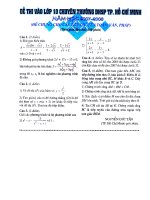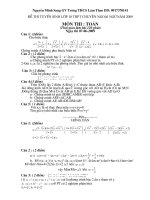Đề thi vào lớp 10 chuyên ngoại ngữ
Bạn đang xem bản rút gọn của tài liệu. Xem và tải ngay bản đầy đủ của tài liệu tại đây (48.12 KB, 4 trang )
Ky thi tuyen sinh lop 10 PTCNN-2002
Thoi gian: 150 phut
Question 1: find out the correct form of the verbs in the box
1. When I (buy)…new house I (ask)… for a telephone. The post office (tell)… me
(wait) …, but I (wait) …a year now and my phone still (not come)…
2. When I (get) …back after lunch, Jean (tell)… me that somebody (phone) … when
I (be) …out
3. I (stay)… in England for a few weeks now. You see, I (be)… a businessman and I
(want)… to improve my English. I (attend) … a special course in business
English at the moment. The course (last) … three weeks.
Question 2: Find out the correct form of the words in the box
Architectures responsible for the (1.contruct) of many skyscrapers believe that a tall
building must always have a certain minimum (2.wide) but that there is no limit to its
absolute (3.high). This means that the skyscrapers of the future are likely to be even
taller.
Engineers agree with this, but there is (4.agree) over the best shape for the tall, slim
buildings. The effects of wind (5.press) mean that cylindrical designs have enjoyed some
(6.popular) in recent years, and there are quite pleasing to the eyes. (7.fotunate), however,
the ideal shape in an ugly square with heavily rounded corners.
Would these tall buildings of the future offer more than a (8.wonder) view? Some
believe tall towers could contain all the (9.require) for modern living. The (10.inhabit) of
these vertical villages would travel up and down between their home and work zones and
would rarely need to journey to ground level.
Question 3: find suitable words to fill each blank
Around the age of sixteen, you must make one of the biggest (1…) of your life. Do I
stay on at (2…) and hopefully go on to university later? Do I leave and start (3…) or
begin a training course?
The decision (4…) your, but it may be worth remembering two (5…). There is more
unemployment among people (6…) haven’t been to university and people who have the
right skills will have a big advantage in the competition for (7…). If you decide to go
straight into a job, there are many opportunities (8…) training. Getting qualification will
help you to get on more quickly in many careers, and evening classes allow you to learn
while you earn. Staring work and taking a break to study (9…) you are older is another
possibility. This way, you can (10…) up money for your student days, as well as getting
practical work experience.
Question 4: Find out and correct the mistakes.
1.
2.
3.
4.
5.
These lessons are very interested.
They are looking forward to see her again.
There is a few water in the pot.
Last week he had his head-phone repair at the shop.
He didn’t go to that meeting, was he?
Question 5: Choose the one best answer A-B-C or D to each question
following the passage on the basic of what is stated or implied in that
passage.
Harvard University is situated along the banks of the Charles River in Cambridge,
Massachusetts. The university now a sprawling complex of more than 400 buildings,
housing, classrooms, laboratories and libraries.
The Harvard faculty has produced 27 Nobel laureates and more than 20 winners of
prestigious Pulitzer Prize. Today the university has more than 16000 students and over
2300 full-time faculty members.
Harvard is consistently ranked as one of the best school in American and the world.
And it is considered a leading international research institution. The university owners its
reputation as a centre for academic excellence to its profession and graduated schools, as
well as its undergraduate program. The Medical, Law, Business and Divinity schools are
leaders in their fields, attracting top students from around the world.
Beginning in the 1930s, Harvard made a conscious effort to recruit students from all
over the US, not from the eastern part of the nation. More recently, the University has
pursued policies to increase the number of women and minority students on campus. A
long tradition of modification and change continues, but the commitment to academic
excellence remains at the heart of Harvard education.
1. Which of the following statement is true?
A. The Harvard faculty has won 27 Nobel Prizes.
B. The Harvard graduates have won 27 Nobel Prizes.
C. The Harvard faculty has won more than 20 Pulitzer Prizes
D. The Harvard graduates have won 27 Nobel Prizes, but no Pulitzer Prize
2. Harvard includes three of following except……..
A. professional schools
B. graduate program
C. job training program
D. undergraduate program
3. Three of following are famous schools in Harvard, which is exception?
A. Medical school
B. Mathematics school
C. Divinity School
D. Business School
4. Since 1930s, Harvard has tried to enroll students from…..
A. all over the US
B. all over the world
C. eastern part of the country
D. western part of Europe
5. Harvard has managed to increase the number of ….. students on campus
A. top B. Asian
C. women and minority
D. women and black
Question 6: Choose the one best answer A-B-C or D to complete the
following passage.
Visitors to Britain are always complaining about English food. But they do not
really know what they are talking about because they rarely get a chance (1) it. Most
of the (2) in large towns have foreign (3) who serve foreign food. (4) visitors are
invited (5) in an English home their (6) often feel they must (7) them something
foreign and exotic.
Those of us who (8) know English food are aware that at its best it can be (9) very
good. On the other (10) it is true to say that it is sometimes terrible. Part of the
problem is that we are not really interested in food- we eat to live, we do not live to
eat. So we don’t generally (11) the necessary time and effort which are needed to
cook really good meals. We (12) food that is simple and easy to cook, (13) ready
prepared food which only needs (14) up before eating.
You can find the best English food in the country away from the large towns,
where life is (15) and people are not in such a hurry. But, of course, most visitors
come from London. They come because they are interested in shopping and
sightseeing. They do not come to find the food. So why should they complain about
it.
1A.to think
B. to cook
C. to eat
D. to fetch
2A.dinning-rooms
B. dining-halls
C. restaurants
D. stores
3A.owners
B. visitors
C. eaters
D. guests
4A.The
B. when
C. No
D. Any
5A.drinking
B. eat
C. to eat
D. to drink
6A.masters
B. owners
C. host
D. keepers
7A.fetch
B. take
C. carry
D. offer
8A.do
B. did
C. don’t
D. didn’t
9A.hardly
B. really
C. never
D. almost
10A.side
B. way
C. hand
D. point
11A.cost
B. spend
C. kill
D. occupy
12A.would rather
B. prefer
C. hate
D. take
13 A. or
B. nor
C. but
D. neither
14 A. heat
B. heated
C. heating
D. hot
15 A .slower
B. quicker
C. slowly
D. quickly
Question 7: Use these given words to fill the blanks.
A. when
F. catch
B. missed
G. angry
C. went
H. late
D. because
I. ran
E. discover
J. clock
I had a very bad day yesterday. Everything (1) wrong. In the morning, my alarm (2)
didn’t ring so I woke up an hour (3). In such a hurry that I burned my hand (4) I was
making breakfast. Then I ran out of the house to (5) the 8.30 bus, but of course I (6) I
was very unhappy (7) my teacher gets (8) if anyone is late for class. I (9) three miles
to the school only to (10) that it was Sunday.
Question 8: Finish each of the following sentences in such a way that its
means exactly the same as the sentence printed before it
1. who does this book belong to
whose…………………………….
2. I didn’t learn my lesson, so I got bad mark
If I ……………………………………………
3. She started work for that company a year ago.
She has been……………………………………
4. it’s pity I didn’t take my doctor’s advice.
I wish……………………………………………
5. it is a three hour drive from Hanoi to Haiphong.
Question 9: complete the sentences below using the provided words and
phrases.
1)
2)
3)
4)
5)
Albert Einstein/ born/ 1897/ Germany/ die/ 1955
He/ graduate/ University of Zurich/ 1905
1919/ win/ the Nobel Prize/ physics.
1919/ to 1933/ live/ Germany/ travel/ lot/ talk/ scientists
1933/ leave/ Germany/ United States/ live/ until/ death.









